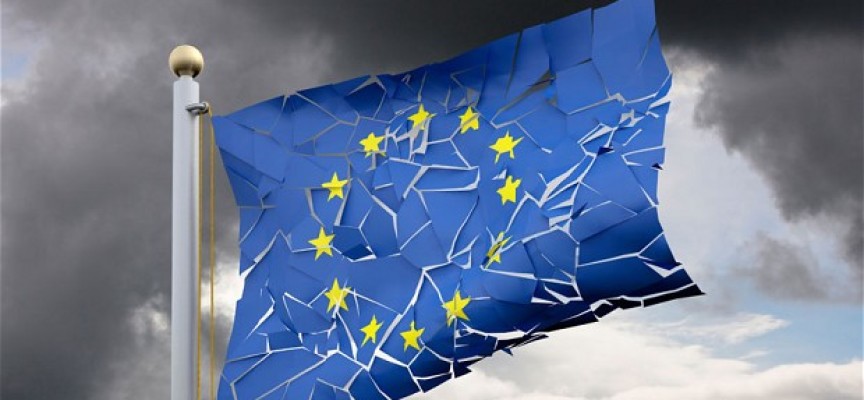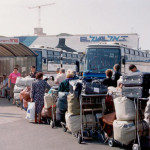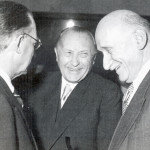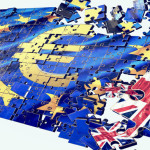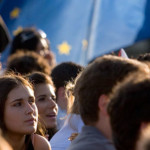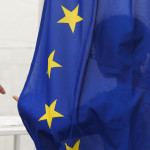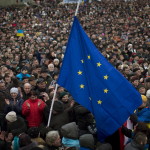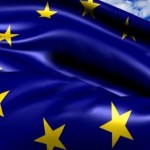That 25th March 1957, when, in Rome, Belgium, Germany, Luxembourg, Holland, France and Italy signed the treaty that established the European Economic Community, an epoch-marking event that was supposed to spark off such a political integration process as to change the view of the fates of the European populations, feels really very distant now. The outcome is universally considered a real disappointment: a bureaucratic Moloch that sacrifices his children, blaming them for all sorts of mistakes, delays, omissions and costs, and that spreads more and more scepticism and aversion.
For the first time in the history of mankind, we have witnessed the birth of a currency without a State, with dramatic consequences on the system that made us financially competitive with the rest of the world.
More and more often now we hear talks of Northern and Southern Europe, of Eastern and Western Europe, of a new Europe and an old Europe, in short a merely geographical Europe. But where do the populations, the people who make up such an outstanding human mosaic, live?
Klemens von Metternich, Ministry of Foreign Affairs and Chancellor of the Austrian Empire from 1814 to 1848, was much more honest in his plan of building a united Europe when he defined Italy as a geographical term. Nowadays, the same term seems to be still perfectly applicable to Europe! In recent times, we have also heard the phrase “a two-speed Europe”, as if we were talking about a car. This is a Europe without a future, because it has no humanity, no soul, in other words, no Europeans. Hence the belief that Europe was more of a Europe one century ago, when my grandmother could take a train in Trieste and be in Transylvania within a day without a passport, when the mail travelled from Cracow to Trieste in three days, the currency was a single one even then but it was made of gold. And that’s not all, there was even more spiritual cohesion, the result of shared, undisputed Christian roots, and more cultural cohesion as well, the result of centuries-old respect and osmosis between different ethnic groups. Then, the nationalist intoxication raged like a pandemic that killed hundreds of millions of people, with ethnic deportations of biblical proportions, hatred, racial persecution and purges that were like veritable genocides. Despite this, for many people a national State is still a dogma of faith.
But which can be the status and purpose of a national State in a real European federation or confederation? After all it is since the Christmas Eve of the 19th century that we have been witnessing all sorts of plans for a European model, from the Carolingian model to the Hapsburgs’ model, from Napoleon’s model to Hitler’s. Over these last 1214 years, we have been witnessing a multitude of attempts at making Europe and we have really seen all sorts of things. But the only way that feels even remotely certain is the one that makes the roots of Europe fertile again, the one that acknowledges, respects and promotes the forces that make Europe’s identity, which are its real ethnic groups that have nothing to do with the national States, often recent and sometimes strained or fake bureaucratic forms with no connection whatsoever with real history. Evidence of this is actually the fact that in 1957 the European States were just 33, while now we already have 45. A gradual fragmentation, which does not even seem to be over yet, as well as an aspiration to freedom that swept over the entire Continent, from the Atlantic to the Urals! Setting off on such a journey may give hope back to the European populations and may revive Europe, which will draw strength from its actual identities, for a universally-felt, intimately-shared political cohesion.
So everyone, proud of their roots, will also feel proud, again, to give Europe the best of its inherent values, its specific traits and features. And such Europe will no longer be the Europe of bureaucrats, of quotas, parameters, traders, stock exchanges, banks, financial multinationals, the ECB, the spread, the size of eggs, the curve of bananas or the diameter of peas, but a political and moral Europe, a cultural and spiritual Europe, in other words a Europe as one’s home, the fair-minded mother of all its Heimat. This is the reflection proposed for the tenth International Forum of the Aquileia Euro-Region (Udine, 23-24 October 2014), about “Europe without Europe. Crisis in Europe or Europe in crisis?”,increasingly sure that we are all bonded by the same fate, which disregards the current fronts, parties, governments and currencies, where an increasingly important role, for economic and political cohesion and harmonisation, is played by the macro-areas, the macro-regions, the euro-regions and the marginal or border regions, such as Friuli Venezia Giulia.
Sembra davvero molto lontano quel 25 marzo 1957 in cui, a Roma, Belgio, Germania, Lussemburgo, Olanda, Francia e Italia firmarono il trattato istitutivo della Comunità economica europea, un atto di rilevanza epocale che avrebbe dovuto innescare un processo d’integrazione politica tale da determinare una nuova visione dei destini dei popoli europei. Il risultato è ormai universalmente considerato deludente: un moloch burocratico che sacrifica i suoi figli, addebitando loro errori, ritardi, omissioni e costi, e che diffonde sempre più scetticismo e contrarietà.
Per la prima volta nella storia dell’umanità abbiamo visto nascere una moneta senza Stato, con conseguenze drammatiche sul nostro sistema di competitività finanziaria con il resto del mondo.
Sentiamo sempre più spesso parlare di Europa del Nord e del Sud, di Europa dell’Est e dell’Ovest, di nuova Europa e vecchia Europa, insomma di un’Europa meramente geografica. Ma i popoli, le genti che compongono questo straordinario mosaico umano dove vivono?
Klemens von Metternich, ministro degli Esteri e cancelliere dell’Impero d’Austria dal 1814 al 1848, fu molto più sincero nel suo disegno di costruire un’Europa unita, definendo l’Italia un’espressione geografica. Oggi la stessa espressione appare attribuibile integralmente all’Europa! In tempi recenti abbiamo udito anche l’espressione “Europa a due velocità”, come se stessimo ragionando di un’autovettura. Questa è un’Europa senza futuro in quanto priva di umanità, di anima, ovvero di europei. Da ciò la convinzione che l’Europa era più Europa un secolo fa, quando mia nonna andava in treno in giornata da Trieste alla Transilvania senza passaporto, la posta arrivava in tre giorni da Cracovia a Trieste, la moneta era già unica ma d’oro. Non solo, c’era pure maggior coesione spirituale, derivante dalle comuni e indiscusse radici cristiane, e culturale, derivante da un secolare rispetto e osmosi fra etnie. Poi infuriò l’ubriacatura nazionalista, una pandemia che fece centinaia di milioni di morti, deportazioni etniche di proporzioni bibliche, odi, persecuzioni ed epurazioni razziali che hanno rappresentato dei veri e propri genocidi. Nonostante ciò, lo Stato nazionale è ancora per molti un dogma di fede.
Ma quali potranno essere status e funzione di uno Stato nazionale in una reale federazione o confederazione europea? D’altronde è dalla notte di Natale dell’Ottocento che assistiamo a svariate proposte di modello europeo, dal modello carolingio a quello asburgico, da quello napoleonico a quello hitleriano. Nel corso di questi 1214 anni abbiamo assistito a innumerevoli tentativi di fare l’Europa e ne abbiamo veramente viste d’ogni sorta. Ma la sola via che appare dare certezza è quella che rende nuovamente fertili le radici, ovvero riconosce, rispetta e valorizza le forze identitarie d’Europa, vale a dire le sue etnie autentiche, che nulla hanno a che vedere con gli Stati nazionali, spesso formazioni burocratiche recenti e talvolta forzate o fasulle rispetto alla verità storica. La dimostrazione di ciò è proprio il fatto che nel 1957 gli Stati europei erano solamente 33, mentre oggi siamo già a 45. Un processo di frammentazione che peraltro non appare affatto esaurito, ma anche un anelito di libertà che ha pervaso l’intero Continente, dall’Atlantico agli Urali! Intraprendere questo cammino potrà ridare speranza ai popoli europei e rafforzare l’Europa, che proprio dalle sue reali identità trarrà forza per una coesione politica generalmente percepita e intimamente condivisa.
Ognuno così, con l’orgoglio delle proprie radici, ritroverà anche l’orgoglio di dare all’Europa il meglio dei suoi intrinseci valori, delle sue specificità e caratteristiche. E questa Europa non potrà essere più quella dei burocrati, delle quote, dei parametri, dei mercanti, delle borse, delle banche, delle multinazionali finanziarie, della BCE, dello spread, della dimensione delle uova, della curvatura delle banane e del diametro dei piselli, ma un’Europa politica e morale, culturale e spirituale, insomma un’Europa patria, madre equanime di tutte le sue heimat. Questa la proposta di riflessione per il decimo Forum internazionale dell’Euroregione aquileiese (Udine, 23-24 ottobre 2014), sul tema “L’Europa senza Europa. Crisi in Europa o Europa in crisi?”, sempre più convinti che siamo tutti legati da un medesimo destino, che prescinde gli attuali schieramenti, appartenenze, governi e monete, e ove sempre più svolgono invece un rilevante ruolo di coesione e armonizzazione economica e politica le macro-aree, macro-regioni, euro-regioni e regioni marginali o di confine, come il Friuli Venezia Giulia.
Ein gleiches Schicksal
Er scheint unendlich weit zurückzuliegen, jener 25. März 1957, als in Rom der Vertrag zur Gründung der Europäischen Wirtschaftsgemeinschaft von Belgien, Deutschland, Luxemburg, den Niederlanden, Frankreich und Italien unterzeichnet wurde. Es war ein Akt von epochaler Bedeutung und sollte einen politischen Integrationsprozess in Gang setzen, mit dem Ziel einer neuen Vision des Schicksals der Völker Europas. Das Ergebnis wird inzwischen allgemein als enttäuschend anerkannt: ein bürokratischer Moloch, der seine Kinder opfert, indem er ihnen Fehler, Verzögerungen, Versäumnisse und Kosten zur Last legt, und der zunehmend Skepsis und Missbilligung hervorruft.
Zum ersten Mal in der Geschichte der Menschheit haben wir die Entstehung einer Währung ohne Staat erlebt, mit dramatischen Folgen für unser System der finanziellen Wettbewerbsfähigkeit gegenüber dem Rest der Welt. Es ist immer häufiger die Rede von Nordeuropa und Südeuropa, Osteuropa und Westeuropa, von neuem Europa und altem Europa – kurzum, von einem rein geografischen Europa. Aber die Völker, die Volksgemeinschaften, die dieses außergewöhnliche menschliche Mosaik bilden, wo leben sie?
Klemens von Metternich, Außenminister und Staatskanzler des österreichischen Kaiserreichs von 1814 bis 1848, war aufrichtig bemüht um den Aufbau eines vereinten Europas und prägte den Satz: «Italien ist ein geografischer Begriff». Dieser Satz könnte heute auf ganz Europa angewendet werden!
Es ist noch nicht lange her, dass auch ein «Europa der zwei Geschwindigkeiten» diskutiert wurde, als ob von einem Automobil die Rede wäre. Es ist ein Europa ohne Zukunft, weil es ihm an Menschlichkeit, an Seele beziehungsweise an Europäern mangelt. Dies führt mich zur Erkenntnis, dass das Europa vor hundert Jahren europäischer war als das heutige; als nämlich meine Großmutter ohne Pass in einem Tag mit dem Zug von Triest nach Siebenbürgen fuhr, als die Briefpost von Krakau nach Triest drei Tage brauchte und als bereits eine einheitliche Währung existierte, nämlich die Gold-Lira. Mehr noch, es herrschte auch ein größerer geistiger Zusammenhalt, der auf gemeinsamen christlichen Wurzeln basierte, und ein kulturelles Zusammengehörigkeitsgefühl, das auf gegenseitigem Respekt und dem Austausch zwischen ethnischen Gruppen in derselben Gesellschaft beruhte. Dann entbrannte der nationalistische Rausch, eine Pandemie, die Hunderte von Millionen Todesopfer forderte, Deportationen biblischen Ausmaßes mit sich brachte, Hass, Verfolgung und ethnische Säuberungsaktionen, die eigentliche Völkermorde darstellten. Und dennoch ist der Nationalstaat noch immer für viele ein Dogma.
Doch welches können in Zukunft status und Funktion eines Nationalstaats in einer echten europäischen Föderation oder Konföderation sein? Seit jenem Weihnachtsgottesdienst im Jahr 800 in der Basilika von Sankt Peter, als Karl dem Großen vom Papst die Kaiserkrone aufgesetzt wurde, sind uns viele Vorschläge eines europäischen Modells vorgelegt worden, vom karolingischen Modell des habsburgischen Reichs, dem Modell Napoleons bis zu Hitler. Im Laufe dieser 1214 Jahre haben wir zahllose Versuche jeder Art erlebt, ein vereintes Europa zu schaffen. Doch der einzige Weg, der Sicherheit zu gewährleisten scheint, ist derjenige, der die Wurzeln wieder neu belebt, beziehungsweise die identitätsstiftenden Kräfte Europas anerkennt, respektiert und zur Geltung kommen lässt, das heißt seine authentischen ethnischen Gruppen. Diese haben nichts mit Nationalstaaten zu tun, die oft jüngere bürokratische Konstrukte sind, manchmal sogar erzwungen oder nicht der historischen Wahrheit entsprechend. Der Beweis dafür ist gerade die Tatsache, dass die europäischen Staaten im Jahr 1957 nur 33 waren, während es heute bereits 45 sind. Ein Zerstückelungsprozess, bei dem noch kein Ende in Sicht ist, aber auch ein Verlangen nach Freiheit, das den gesamten Kontinent ergriffen hat, vom Atlantik bis zum Ural! Diesen Weg einzuschlagen, kann den europäischen Völkern wieder Hoffnung schenken und Europa stärken, weil gerade seine authentischen Identitäten ihm Macht verleihen im Hinblick auf eine umfassend anerkannte und innerlich mitgetragene Kohäsionspolitik.
Auf diese Weise ist jeder stolz auf seine eigenen Wurzeln und wird damit auch wieder mit Stolz seinem Europa das Beste schenken, dessen er durch seine spezifische Wesensbestimmung und Charakteristiken fähig ist. Und dieses Europa kann nicht mehr das Europa der Bürokraten, Quoten, Parameter, Händler, Börsen, Banken, multinationalen Konzerne, der EZB, des Spread, der Ausmaße von Eiern, der Krümmung von Bananen und des Durchmessers von Erbsen sein, sondern ein politisches und moralisches, kulturelles und geistiges Europa; kurzum, ein Europa, das jedem eine Heimat ist. Dies ist mein Diskussionsvorschlag zum zehnten Internationalen Forum der Euroregion in Aquileia (Udine, 23. – 24. Oktober 2014), mit dem Thema „Europa ohne Europa. Krise in Europa oder Europa in der Krise?“ Ich bin mehr und mehr davon überzeugt, dass uns alle das gleiche Schicksal vereint, und zwar unabhängig vom jeweiligen politischen Lager, den Zugehörigkeiten, Regierungen und Währungen, während dagegen immer häufiger Makroregionen, Euroregionen und periphere Regionen oder Grenzregionen wie Friaul-Julisch Venetien eine wichtige Rolle spielen für das Zusammengehörigkeitsgefühl und die Harmonisierung der wirtschaftlichen und politischen Makrobereiche.
Paolo Petiziol
Presidente dell'Associazione culturale Mitteleuropa
www.mitteleuropa.it
Latest posts by Paolo Petiziol (see all)
- Sharing the same fate - 18 ottobre 2014
- The idea of Mitteleuropa - 23 agosto 2014

